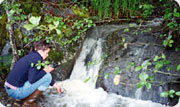Welcome to Douglas College's Environmental Science site! Please explore to find out more about studies and careers in this field.
What does the future hold regarding global warming, air and water pollution, human population growth and loss of biological diversity? How can a scientific perspective improve our understanding of these and other environmental issues? The Environmental Science program allows you to explore the issues that affect us locally and globally.
Program highlights
Because the issues involved are often complex and multi-faceted, Environmental Science requires an interdisciplinary approach. Students complete courses in a variety of science disciplines like Biology, Geology and Chemistry but also take courses in the Arts, Humanities, Social Sciences and Business. In your program, you may explore subjects as diverse as Environmental Geology, Urban Ecology, Environmental Ethics and Marine Biology. All students in the program take core courses in Environmental Science that are taught with an interdisciplinary approach.
Transfer options
Douglas College offers the specialized Associate in Science Degree as one of the university transfer programs in the Faculty of Science and Technology. After successfully graduating from this program, you can transfer into third-year degree studies at universities such as SFU, UBC, the University of Victoria and many other institutions in Western Canada. (Check the transfer rules and requirements with the respective university and at the BC Transfer Guide.) You can also complete a block transfer of all your courses into third year of the Bachelor of Science (Environmental Sciences) programs at Royal Roads University and the University of Lethbridge.
Student success story
Gain hands-on experience
If you're interested in working in a related field, Environmental Science also offers a Co-operative Education option. This allows you to earn College credits for paid work placements in a job related to your studies.
Career Opportunities
Depending on your specialized interest, careers for Environmental Science graduates can be as varied as the field itself. Generally, most people working in careers related to Environmental Science have completed at least a bachelor's degree - often with specific training or education for their specialized field.

